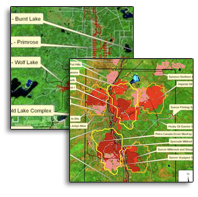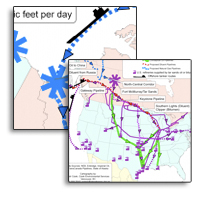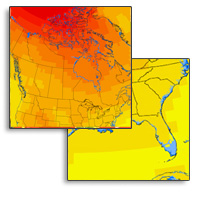Tar Sands 101
The Tar Sands "Gigaproject" is the largest industrial project in human history and likely also the most destructive. The tar sands mining procedure releases at least three times the CO2 emissions as regular oil production and is slated to become the single largest industrial contributor in North America to Climate Change.
The tar sands are already slated to be the cause of up to the second fastest rate of deforestation on the planet behind the Amazon Rainforest Basin. Currently approved projects will see 3 million barrels of tar sands mock crude produced daily by 2018; for each barrel of oil up to as high as five barrels of water are used.
Human health in many communities has seriously taken a turn for the worse with many causes alleged to be from tar sands production. Tar sands production has led to many serious social issues throughout Alberta, from housing crises to the vast expansion of temporary foreign worker programs that racialize and exploit so-called non-citizens. Infrastructure from pipelines to refineries to super tanker oil traffic on the seas crosses the continent in all directions to allthree major oceans and the Gulf of Mexico.
The mock oil produced primarily is consumed in the United States and helps to subsidize continued wars of aggression against other oil producing nations such as Iraq, Venezuela and Iran.
To understand the tar sands in more depth, continue to our Tar Sands 101 reading list
Agencies Differ on Tar Sands Pipeline
Agencies Differ on Oil Sands Pipeline
July 21, 2010, 10:03 am
By ELISABETH ROSENTHAL
NYTimes
As we’ve reported, the State Department is considering whether to approve a huge new pipeline called Keystone XL that will bring crude from Canada’s oil sands all the way to the Gulf of Mexico.
A new pipeline would vastly expand the amount of oil extracted from Canadian oil sands that is used in the United States – which could be good in terms of energy security.
Crews battle out-of-control wildfire near Fort McMurray
Crews battle out-of-control wildfire near Fort McMurray
Jennifer Earl-King and Grant Farhall
Jul 25, 2010
More than 40 firefighters, five helicopters and air tankers continue to battle an out-of-control blaze in northern Alberta.
It's been burning since Saturday about 80 kilometres northeast of Fort McMurray.
There has been some concern about the safety of workers at Firebag, a Suncor Energy site, which is only 13 kilometres away from the fire.
Wildfire information officer Rob Harris tells 660News there's no need to evacuate the area.
Why did a parliamentary committee suddenly destroy drafts of a final report on tar sands pollution? Here's what they knew.
What Those Who Killed the Tar Sands Report Don't Want You to Know
Why did a parliamentary committee suddenly destroy drafts of a final report on tar sands pollution? Here's what they knew.
By Andrew Nikiforuk, 15 Jul 2010,
TheTyee.ca
Shredder
Shredded: Standing Committee on Environment and Sustainable Development abruptly cancelled tar sands report.
CPPIB buys Laricina stake, extends tar sands foray
CPPIB buys Laricina stake, extends oil sands foray
2010-07-06
By Pav Jordan
TORONTO, July 6 (Reuters) - Canada Pension Plan Investment Board extended its foray into Canada's oil and gas sector on Tuesday, buying a 17.1 percent stake in closely held Calgary oil sands company Laricina Energy Ltd.
The CPPIB, which invests surplus cash from the national Canada Pension Plan, has some C$127 billion ($121 billion) in assets under management. The board paid C$250 million, or C$30 each, to acquire more than 8.3 million common shares of Laricina in a private placement.
Ophir to Acquire Interest in Madagascar Block
Ophir to Acquire Interest in Madagascar Block
Ophir Energy plc
|
Tuesday, July 13, 2010
Ophir has entered into an agreement with Wilton Petroleum to acquire an 80% interest and Operatorship of a Production Sharing Contract (PSC) over an area designated as the Marovoay Block 2102, onshore Madagascar.
The Block 2102 lies in the coastal area of northwest Madagascar covering an area in excess of 12,000km2. The PSC was awarded to Wilton following a competitive licensing round in 2006.
"Madagascar: Heavy Oil Promises a Bright Future for this Island Country"
Madagascar: Heavy Oil Promises a Bright Future for this Island Country
~July 17 2010
Pretty soon, the world’s fourth-largest island off the southeastern coast of Africa will be known more for heavy oil than it is known for the ring-tailed lemur. Experts estimate that out of the 600,000 square miles that make up Madagascar, half of the island is covered by the heavy oil-rich sedimentary basins of Morondava, Majunga and Ambilobe.
Total expands tar sand holdings
Total expands oil sand holdings
July 12, 2010
CALGARY, Alberta, July 12 (UPI) -- French energy company Total is looking to expand its holdings in oil sands through a $1 billion deal to tap into Alberta, Canada, recent transactions show.
Total is expanding its portfolio in Alberta's tar sands through a $1 billion bid for UTS Energy of Calgary, the Financial Times reports.
Alberta assets held by UTS Energy are estimated at more than 3 billion barrels of oil, the report adds.
Ignatieff — in Alberta — talks down proposed Gateway pipeline
Ignatieff — in Alberta — talks down proposed oilsands pipeline
By Renata D’Aliesio, Canwest News Service
July 11, 2010
CALGARY — Federal Liberal Leader Michael Ignatieff chastised the Harper government Saturday for waiting too long to build a relationship with China — but he remained steadfast against the prospect of tankers shipping oilsands fuel to Asia from the northern B.C. coast.
Ignatieff, in Calgary for a Liberal Stampede breakfast fundraiser, renewed his call for a ban on oil tankers in northern British Columbia.
Blowout near Conklin shoots steam and bitumen into the air
This project-- Devon Jackfish-- had only just announced their approval to double in size. They also just got a few million dollars as "cutting edge leaders" in C02 "capture" technology. They are supposed to be among the best of the tar sands companies in terms of "performance" and "doing the right thing".
Canadian Tar Sands Will Become Top US Crude Source
Canadian Oil Sands Will Become Top US Crude Source
Published: Monday, 28 Jun 2010
By: Justin Solomon
CNBC Producer
As the future of offshore drilling remains in jeopardy, more investors and energy companies are focusing their attention on the US's neighbor to the north, Canada.
Canada has proven oil reserves of more than 170 billion barrels—second only to those in Saudi Arabia. Much of that crude lies beneath the tundra of Alberta in a thick oil, sand and water mixture called bitumen, more commonly called oil sand.



